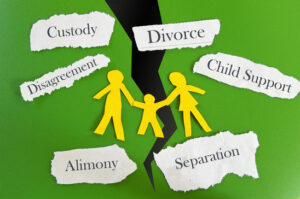
The Trenton, Florida child support lawyers at the Shochet Law Group can help you understand the child support amount you might be entitled to receive, help you understand your child support obligations if your former partner will have full custody, assist you in establishing paternity so you can request child support, and help you demand child support payments from a spouse who will not pay child support. Under Florida law, both parents have a legal obligation to support their children financially. If you and your former spouse are getting separated or divorced, and the children will live primarily with one parent, understanding your child support obligations will be an important aspect of your divorce or separation agreement. The Trenton, Florida child support lawyers at the Shochet Law Group can assist you with all matters related to child support.
How Child Support Amounts are Determined in Florida
Under Florida law, child support amounts are determined based on child support tables and the non-custodial parents’ net earnings. Income is determined based on monthly salary, wages, bonuses, commissions, tips, business income, disability benefits, workers’ compensation benefits, social security benefits, spousal support, interest, rental income, and royalties or other income from an estate or trust. A non-custodial parent can subtract taxes, health insurance payments, spousal support from a prior marriage, and other allowable deductions from net income (like union dues or self-employment tax). The remaining amount is net income. From this monthly income child support payments are determined based on tables set by the state. The amount you’ll pay will depend on how much you make each month and how many children you have. In general, these figures are fixed, though a custodial parent can request more, and the non-custodial parent can request to pay less, if special circumstances arise. Sometimes both parents might agree to pay different amounts if both parents want to contribute to a child’s college savings fund, pay for private schooling or other special needs.
Because the state offers fixed figures for child support, child support amounts are seldom disputed. Problems can arise if a parent hides income or if a parent intentionally remains underemployed to avoid paying child support. If you believe this might be the case, a child support lawyer in Trenton, Florida at the Shochet Law Group may be able to help you.
Establishing Paternity for Child Support in Trenton, Florida
There are several ways to establish paternity in Florida. If the parents are married when a child is born, paternity is automatically established. If the parents are unmarried, paternity can be established by both parents in the hospital (in this case, the father’s name is on the birth certificate). If paternity isn’t established in the hospital, paternity can still be established in other ways. If you marry the child’s father, you can establish paternity when you apply for a marriage license, and if you remain unmarried, both parents can establish paternity voluntarily. Issues can arise if the child’s father denies paternity. In this case, you may need to request a court order to establish paternity.
One of the benefits of establishing paternity is that it lets a child enjoy support from both parents. Paternity also grants the custodial parent the right to get a child support order and also grants the non-custodial parent the right to seek a court order for shared time with the child. If you want your child’s father to pay child support, you may need to establish paternity first. The child support lawyers in Trenton, Florida at Shochet Law Group may be able to assist you with this process.
Former Partner Not Paying Child Support? A Trenton, Florida Child Support Lawyer May Be Able to Help

If your former partner isn’t paying child support or is remaining intentionally under-employed to avoid paying child support, the Trenton, Florida child support lawyers at the Shochet Law Firm may be able to help you. If your child’s father won’t pay child support, you may need to go to court to issue an order for your child’s father to pay child support. There are many ways the state can get your child’s father to pay child support, including garnishing his wages, seizing property, withholding federal tax returns, denying U.S. passport applications, and even punishment with jail time. Even if your ex lives in another state, child support can still be collected under the Unform Interstate Family Support Act.
If you believe your spouse is hiding income or intentionally is remaining underemployed, this may require going to court and may involve a more complicated case. Fortunately, you are not alone. You can still fight to ensure your child receives the support he or she needs. Both parents are required under the law to support their children. If you need help collecting the child support you are owed, reach out to the Trenton, Florida child support lawyers at the Shochet Law Group today. Our child support attorneys are here to help you.
